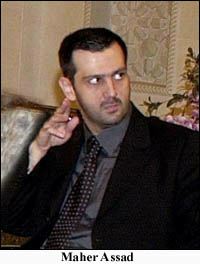 |
| Vol. 3 No. 7 | Table of Contents MEIB Main Page | July/August 2001 |
 |
Air Strike Reinforces Israeli Deterrence Policy
Israeli aircraft destroyed a Syrian radar station in Lebanon on July 1 in reprisal for a Hezbollah attack in the disputed Shebaa Farms area that seriously injured an Israeli soldier. The air strike, the second launched by Israel Syrian military positions in Lebanon since mid-April, is seen as reinforcing a new Israeli deterrence strategy that holds Damascus directly accountable for Syrian-sponsored paramilitary operations against the Jewish state.
About an hour after the air strike, however, Hezbollah guerrillas fired around 80 rockets at Israeli positions in Shebaa Farms, reportedly damaging an Israeli radar site. Israel's decision not to respond significantly to the artillery barrage was interpreted by Hezbollah leaders as a vindication of their strategy. "Each time we get an opportunity, we will seize the occasion to hit the Israeli occupation forces . . . we have ordered an increase in anti-Israeli operations," Hezbollah Secretary-General Hassan Nasrallah said in an interview with Al-Safir (Beirut) on July 4. "The fact that Syrian positions are taken as targets by Israel will not affect our determination to pursue the resistance until the liberation of the Shebaa Farms sector."
Hezbollah Kidnappers Were Disguised as UN Peacekeepers
On July 6, a United Nations official confirmed the existence of a videotape indicating that Hezbollah guerrillas who abducted three Israeli soldiers along the border in south Lebanon on October 7 were disguised as UN peacekeepers. The tape, shot by UNIFIL peacekeepers on the day after the abduction, shows a black Range Rover and white Nissan car used by Hezbollah during the operation. The footage shows UN license plates and pieces of UNIFIL uniforms and insignia inside the Range Rover that were apparently used by Hezbollah to approach the soldiers incognito.
Israeli Defense Minister Binyamin Ben-Eliezer demanded that the tape be handed over to Israeli officials. He complained that UN Special Envoy to the Middle East Terje Larsen had denied the existence of the tape as recently as late June. "Since the kidnapping we have claimed all the time that there is a videotape in the hands of a UN peacekeeper. We asked for it many times. Unfortunately they said no, and no, and no," he said. Some Israeli officials have hinted that UNIFIL unwittingly played a role in the kidnapping. UN Spokesman Fred Eckhard has categorically denied this.
The three Israeli soldiers, along with an Israeli reserve colonel captured shortly afterwards, have been held in a secret location by Hezbollah. According to a July 6 report in Al-Nahar, the European Union is urging Syria to allow a delegate of International Committee of the Red Cross to visit the prisoners.
More Allegations of Military Plot to Oust Hariri
On July 17, Lebanese MP Muhsin Dalloul accused army intelligence officials of leaking to the press a list of Lebanese politicians who allegedly owe millions of dollars in unpaid electricity bills. Dalloul, a former defense minister, said that the leak was the latest in a series of moves by the military to discredit Prime Minister Rafiq Hariri and his allies.
Although there is no evidence to support this allegation, a measure of how seriously these claims are taken by the population is the fact that the defense ministry released a communiqué adamantly denying them. "In the ongoing political controversies some statements have been made against the national role of the army and its branches, insinuating the existence of power schemes that contradict the commitment of the military establishment to its national duties as spelled out in the constitution," said the statement. "The Defense ministry warns that implicating the military establishments in such alleged schemes that suggest a clash between two platforms would hurt political stability and hurt the army's role in safeguarding law and order."
On May 31, former Information Minister Bassem Sabaa stated in parliament that the security services were conspiring to oust Hariri and "proclaim martial law" and that the phone calls of the country's leading politicians were being illegally monitored.
Nayyouf: Syria Still Holds Lebanese Detainees
During a July 16 press conference in France, Syrian journalist Nizar Nayyouf flatly refuted Syrian President Bashar Assad's claim that all Lebanese illegally detained in Syrian prisons have been released. "Mr. Bashar Assad's statement is not accurate. He might not be aware that hundreds of Lebanese detainees are still held in Syrian jails, besides those that were murdered and buried in mass graves," said Nayyouf, who was released by the Syrian government in May after spending over nine years in prison. "I still remember Toni Tamer, a Lebanese detainee from the Lebanese city of Entelias," he later added. Nayyouf said that he had "personally checked" the above-mentioned mass graves before the Syrian authorities arrested him. "I saw the bodies that were mutilated with bullets and bombs. The Syrian authorities have recently ordered the transfer of these graves to distant areas."